Data Structures and Algorithm
1/43
There's no tags or description
Looks like no tags are added yet.
Name | Mastery | Learn | Test | Matching | Spaced | Call with Kai |
|---|
No analytics yet
Send a link to your students to track their progress
44 Terms
Sorting Algorithms
Bubble
Selection
Insertion
Shell
Heap
Merge
Quick
Bucket
Radix
Divide and Conquer Algorithms
Merge
Quick
Bubble Sort
Simplest sorting algorithm that works by repeatedly swapping the adjacent elements if they are in the wrong order
Right side sorting
Bubble Sort Complexity
Best - O(n)
Worst - O(n^2)
Average - O(n^2)
Bubble Sort Algorithm
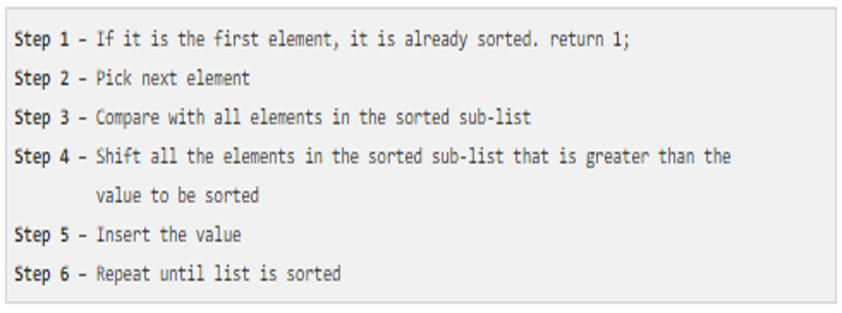
Use Cases
Best - Ω
Worst - O
Average - Θ
Common Time Complexity Symbols
O(1) - constant
O(log n) - logarithmic time
O(n) - linear time
O(n log n) - log-linear time
O(n^2) - quadratic time
O(2^n) - exponential time
O(n!) - factorial time
Selection Sort
Repeatedly finding the minimum element considering ascending order) from the unsorted part and putting it at the beginning
Left side sorting
Selection Sort Complexity
Best - O(n^2)
Worst - O(n^2)
Average - O(n^2)
Selection Sort Algorithm
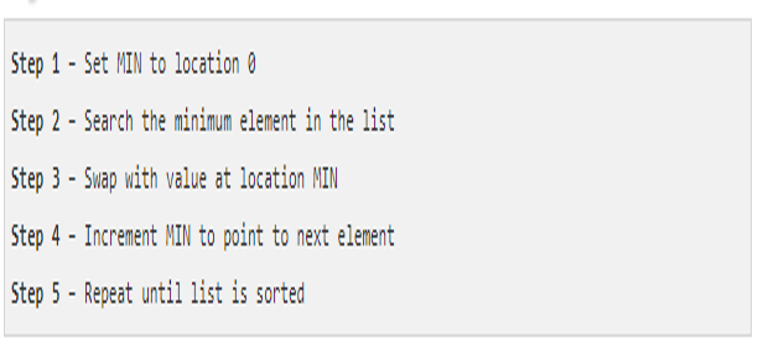
Insertion Sort
In-place comparison-based sorting algorithm
Left side sorting
Bubble sort, but only for one element at a time
Insertion Sort Complexity
Best - O(n)
Worst - O(n^2)
Average - O(n^2)
Insertion Sort Algorithm
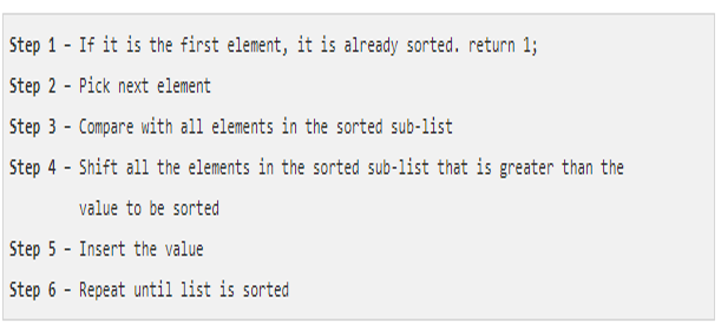
Shell Sort
Long-distance insertion sort
Shell Sort Complexity
Best - O(n log n)
Worst - O(n^2)
Average - O(n^1.5)
Shell Sort Algorithm
Choose a gap sequence: Start with a large gap and progressively reduce it. A common sequence is n/2, n/4, ..., 1, where n is the size of the array
Perform Insertion Sort for each gap: For each gap, perform an Insertion Sort where elements that are gap positions apart are compared and swapped
Repeat until the gap becomes 1, and the array is sorted
Shell Sort Optimal Sequences for Gaps
Original - n/4, n/4, ..., 1
Knuth - (3^n - 1)/2
Sedgewick -1, 5, 19, 41, 109, ... (formula: 4^k + 3 * 2^k + 1)
Hibbard - 1 + 2^0, 1 + 2^2, 1 + 2^4, ...
Papernov & Stasevich - 2^k - 1
Pratt - 1, 3, 5, 7, 9, 11, ... (all numbers of the form 2^i * 3^j)
Heap Sort
Improved selection sort
Tree node for two child nodes
Heap Sort Complexity
Best - O(n log n)
Worst - O(n log n)
Average - O(n log n)
Heap Sort Algorithm
Build a Max Heap: Rearrange the array into a binary heap structure, where the root node is the largest element
Swap the root with the last element: Once the heap is built, swap the root (maximum) element with the last element in the array
Reduce the heap size: After swapping, the last element is considered sorted, so reduce the heap size by one
Heapify the root: Restore the heap property by heapifying the root element, ensuring the subtree rooted at the root is still a valid max heap
Repeat until the heap size is 1
Merge Sort
Divides the input array into two halves, calls itself for the two halves, and then merges the two sorted halves
Uses a merge function to merge two halves
Merge Sort Complexity
Best - O(nLogn)
Worst - O(nLogn)
Average - O(nLogn)
Merge Sort Algorithm
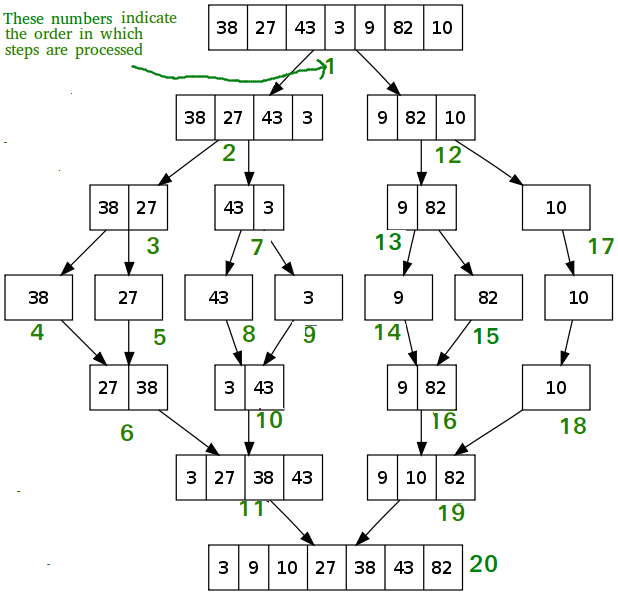
Quick Sort
Picks an element as a pivot and partitions the given array around the picked pivot
Quick Sort Complexity
Best - O(n log n)
Worst - O(n^2)
Average - O(n log n)
Quick Sort Algorithm
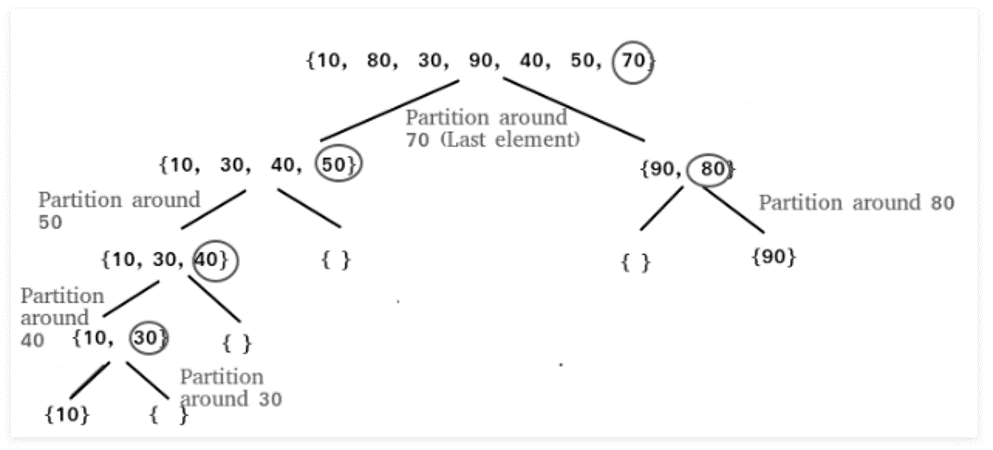
Quick Sort Pivots
First element as a pivot
Last element as the pivot
Random element as a pivot
Median as a pivot.
Bin/Bucket Sort
Divides the array into several buckets with ranges
Bin/Bucket Sort Algorithm

Bin/Bucket Sort Complexity
Best - O(n + buckets)
Worst - O(n^2)
Average - O(n + buckets)
Queue
An n ordered list in which all insertions take place at one end, the rear, while all deletions take place at the other end, the front
Linear data structure
FIFO structure
Enqueue
Inserts queue element to the right (back, end)
Dequeue
Removes queue element from the left (front, start)
enqueue()
public void enqueue(T data)
dequeue()
public T dequeue()
peek()
public T peek()
isEmpty()
public boolean isEmpty()
size()
public int size()
Radix Sort
Used to sort a list of integer numbers in order
Counts digits, then compares per digit, starting from the ones digit
Replaces blanks with zeroes (Ex. 1, 12, 150 → 001, 012, 150)
Radix Sort Complexity
Best - O(n * digits)
Worst - O(n * digits)
Average - O(n * digits)
Radix Sort Algorithm
Define 10 queues each representing a bucket for each digit from 0 to 9
Consider the least significant digit of each number in the list which is to be sorted
Insert each number into their respective queue based on the least significant digit
Group all the numbers from queue 0 to queue 9 in the order they have inserted into their respective queues
Repeat from step 3 based on the next least significant digit
Repeat from step 2 until all the numbers are grouped based on the most significant digit
Queue
Implements Linked-List
Types of Queue
Queue
Priority Queue
Priority Queue
Binary heap queue